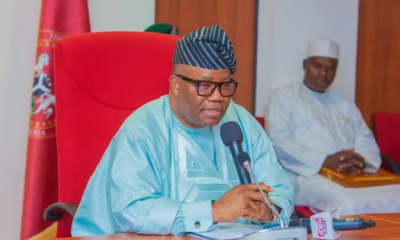The International Monetary Fund (IMF) in the conclusion of the Article IV consultation [1] with Nigeria by the Executive Board of IMF, last week, insisted on the removal of petrol subsidy by the Nigerian government, indicating on Monday that the Nigerian economy is recovering from a historic downturn taking advantage of government policy support, rising oil prices, and international financial assistance. The IMF, accordingly, insisted that the recent economic developments in the country have enhanced Nigeria’s capacity to repay its loan.
After the Article IV consultation [1] with Nigeria by the Executive Board of IMF last week, the IMF in a statement on Monday, declared: “Directors noted that Nigeria’s capacity to repay the Fund is adequate. “They encouraged addressing data gaps to allow timely and clear assessments of reserve adequacy.”
The IMF noted that Nigeria exited the recession in the fourth quarter of 2020 and its output rose by 4.1 per cent (y-o-y) in the third quarter, with broad-based growth except for the oil sector which is facing security and technical challenges.
The Fund projecting growth to be 3 per cent for 2021, indicated that headline inflation rose sharply during the pandemic, reaching a peak of 18.2 per cent year-on-year (y-o-y) in March 2021, but has since declined to 15.6 per cent in December.
The global financial institution emphasized that the sharp inflation rise was a result of the new harvest season and opening of land borders, but admitted the rise in unemployment rates, which at the end of 2020 was yet to come down.
The IMF highlighted: “Despite the recovery in oil prices, the general government fiscal deficit is projected to widen in 2021 to 5.9 per cent of GDP, reflecting implicit fuel subsidies and higher security spending. “Moreover, the consolidated government revenue-to-GDP ratio at 7.5 percent remains among the lowest in the world.
“After registering a historic deficit in 2020, the current account improved in 2021, and gross FX reserves have improved, supported by the IMF’s SDR allocation and Eurobond placements in September 2021.
“Notwithstanding the authorities’ proactive approach to contain COVID-19 infection rates and fatalities and the recent growth improvement, socio-economic conditions remain a challenge. Levels of food insecurity have risen, and the poverty rate is estimated to have risen during the pandemic.”
The IMF directors remarked that the economic outlook remained subject to significant risks, including from the pandemic trajectory, oil price uncertainty, and security challenges.
The director recommended major reforms in the fiscal, exchange rate, trade, and governance to lift long-term, inclusive growth.
The directors emphasised the urgency of fiscal consolidation to create policy space and reduce debt sustainability risks, urging significant domestic revenue mobilisation, including further increasing the value-added tax rate, improving tax compliance, and rationalising tax incentives.
The IMF renewed its pressure on the Nigerian government to remove petrol subsidy, and compensatory measures for the poor and transparent use of saved resources.
The IMF statement read: “Directors welcomed the removal of the official exchange rate and recommended further measures towards a unified and market-clearing exchange rate to help strengthen Nigeria’s external position, taking advantage of the current favourable conditions,
“They noted that exchange rate reforms should be accompanied by macroeconomic policies to contain inflation, structural reforms to improve transparency and governance, and clear communications regarding exchange rate policy.
“Directors considered it appropriate to maintain a supportive monetary policy in the near term, with continued vigilance against inflation and balance of payments risks. They encouraged the authorities to stand ready to adjust the monetary stance if inflationary pressures increase.
“Directors recommended strengthening the monetary operational framework over the medium term—focusing on the primacy of price stability—and scaling back the central bank’s quasi-fiscal operations.
“Directors welcomed the resilience of the banking sector and the planned expiration of pandemic-related support measures. They agreed that while the newly launched eNaira could help foster financial inclusion and improve the delivery of social assistance, close monitoring of associated risks will be important. They also encouraged further efforts to address deficiencies in the AML/CFT framework.
“Directors emphasised the need for bold reforms in the trade regime and agricultural sector, as well as investments, to promote diversification and job-rich growth and harness the gains from the African Continental Free Trade Agreement. Improvement in transparency and governance are also crucial for strengthening business confidence and public trust. Directors called for stronger efforts to improve the transparency of COVID-19 emergency spending.”

 Crime2 days ago
Crime2 days ago
 Latest20 hours ago
Latest20 hours ago
 Editorial6 days ago
Editorial6 days ago
 Agribusiness4 days ago
Agribusiness4 days ago
 Business1 week ago
Business1 week ago
 Business5 days ago
Business5 days ago
 Featured5 days ago
Featured5 days ago
 Agribusiness5 days ago
Agribusiness5 days ago

